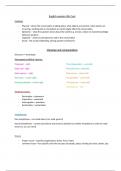English revision (Mr Cox)
Context:
- Physical - where the conversation is taking place, what objects are present, what actions are
occurring, anything else in immediate are which might affect the conversation
- Epistemic – what the speakers know about the world (e.g. morals, culture or shared knowledge
between speakers
- Linguistic – what has already been said in the conversation
- Social – the social relationship among speaker and hearers
Meanings and representations
Discourse = stereotype
Newspaper political stances:
Telegraph – right The independent – centralist
Daily mail –right Financial times- centralist
Daily express – right Daily mirror – centre-left
The times – centre-right The guardian – centre-left
Evening standard – centre-right The observer – centre-left
Morning star – left
Sentence types
- Declarative = statement
- Imperative = command
- Interrogative = questions
- Exclamative = exclamation
morphemes
free morphemes - can stand alone (cat, walk, govern)
bound morphemes - cannot stand alone and must be attached to another morpheme in order to make
sense (re, un, ed, ment)
Nouns
- Proper nouns = specific people/places (Chris, Paris, Mars)
- common nouns = less specific and refer to types of people, places, feeling etc (man, planet, joy)
, - Concrete nouns = things that exist physically, what we can see and feel (tiger, house, computer)
- Abstract nouns = things that do not physically exist, relating to feelings, ideas etc (friendship,
democracy, sadness)
Noun phrase – a group of two or more that includes a modifier [if it has any of these words ‘the, a, an,
many, his, those’ then it is a noun phrase!] – a string of words that all relate to the noun in some way
Nominalisation = turning a noun into a verb or other way around (e.g. can you plate the food?)
Pronouns
Personal pronouns function as a substitute for someone's name (e.g subject pronouns ‘I, you, he/she’
and object pronouns ‘me, you, her, him’)
Possessive pronouns show ownership or possession over a noun (‘my, your, our’)
Relative pronouns connect a word or phrase to a noun/pronoun (‘who, whose, whom’, find the man
who stole the money) - this are often used to add more information
Reflexive pronouns replace the object of a sentence when it refers to the same person/object in the
sentence (‘myself, yourself, himself’)
Interrogative pronouns are used to ask questions (‘who, which, what’)
Demonstrative pronouns take the place of a noun that has already been mentioned (‘this, that, neither’,
I like that jumper)
Adjectives/adverbs
Attributive [pre-modifying] = an adjective before the noun (the black bear)
Post modifying [pre-dicative] = an adjective after the noun (the flowers of pink and white)
Comparative = generally add ‘-er’ (brighter)
Superlative = generally add ‘-est’ to express the highest degree of quality (that was the best parcel)
Adverbials
Adverb = 1 word adverbial = more than 1 word (functioning as an adverb)
- Manner – how? (mostly ending in ...ly)
- Place – where?
- Time – when? up, down, in, around = prepositions
- Frequency – how often?
- Degree – to what extent?
- Reason – why?




